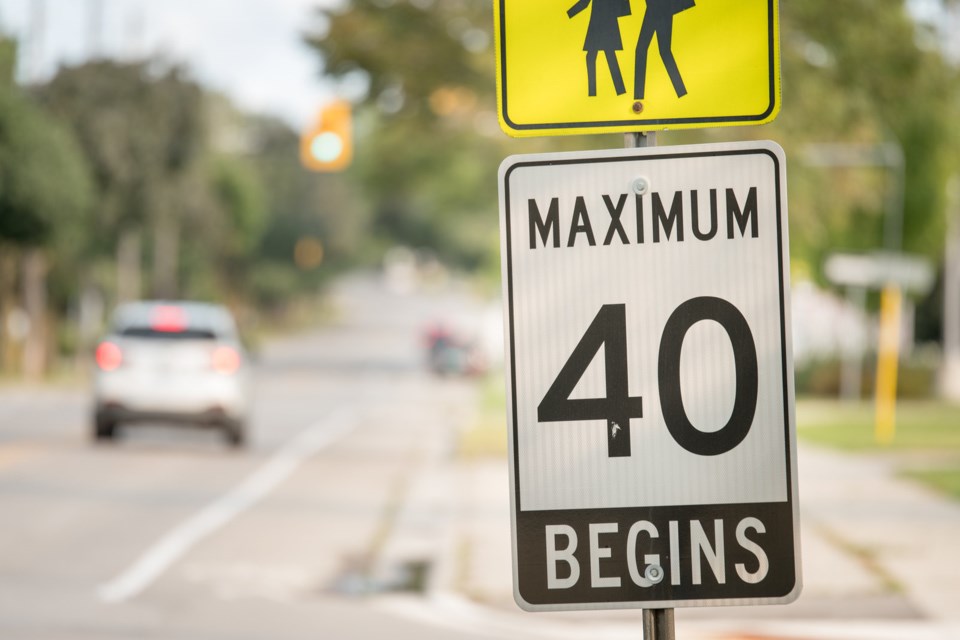Changes to St. Albert's traffic bylaw that would lower residential speed limits to 40 km/h gained committee support on Monday.
On Jan. 18, city administration gave a presentation to council's community growth and infrastructure standing committee (CGISC) detailing the various changes, public response and next steps.
If approved at council proper, drivers could press on the gas a little more on sections of some arterial roads, but local roadway speed limits would be reduced from 50 km/h to 40 km/h.
The change would help the city move toward its transportation safety plan and long-term "Vision Zero" goal of zero deaths or major injuries from traffic collisions, said Dean Schick, manager of transportation. He explained one third of collisions, and 15 per cent of severe collisions, occur on neighbourhood roadways in St. Albert.
"Speed is known to influence severity of collisions, and a reduction is very likely to have a positive influence to reduce injury probability," Schick said.
Last February, council approved $20,000 in funding to hire Politikos Research to do public engagement to get feedback on the speed changes. Two surveys were offered during that time, with the online survey recording 3,016 responses and 5,281 postcard surveys returned. Both a focus group and virtual town hall meetings were held in September.
Implementation of the recommendations would cost around $230,000, which would cover pedestrian crossing improvements, speed sign changes, playground zone sign changes,and public notification. If approved at council, these funds would empty the city's traffic safety reserve.
The CGISC unanimously passed a motion to ask council to approve first reading of the changes to the traffic bylaw and set a public hearing date for Feb. 16.
Lower neighbourhood limit
Reducing neighbourhood road speeds was "the most contentious" item among people who answered the surveys, Schick said.
Fifty-seven per cent of respondents said they were against reducing the speed limit from 50 km/h to 40 km/h, while 43 per cent said they were in support. Those who were against gave several reasons as to why, calling the changes unnecessary and something that would increase travel times.
Schick said the time difference between travelling 40 km/h and 50 km/h over three kilometres is about one minute, a "negligible" difference of time for drivers using neighbourhood roads. Only implementing the reduction to local roads instead of both local and collector roads would only cause confusion for drivers, he said.
He also noted the City of Edmonton approved a reduced speed limit from 50 km/h to 40 km/h last November.
With collisions increasing on local roadways, Schick said reducing speed can be one way to address that. A 40 km/h limit was put in place in Erin Ridge as a pilot project in 2019, and Schick said preliminary data from that decision seems to show lower collision levels, though a year of data isn't enough to establish a trend.
Playground zones
Only 34 per cent of respondents said they were in support of changing school zones to playground zones for elementary school sites. Schick said with that in mind, administration recommended the city keep school zones the same.
"Existing school zones would stay as they are, from 8 a.m. to 4 p.m. on school days only," he said.
Reduced speeds in playground zones would apply from 8 a.m. to 8 p.m. from April 1 to Oct. 31, depending on whether council agrees to the 40 km/h recommendation. If council doesn't decrease those speeds, the new extended time would apply year-round.
Depending on council's approval of reduced neighbourhood speeds, administration recommended removing two of the playground zones for 40 km/h signs at the Forest Drive and Deerbourn (south) locations. Attwood Drive is recommended to remain as a playground zone.
Arterials
Eighty-two per cent of online respondents and 90 per cent of postcard surveys were in support of increasing speed limits from 50 km/h to 60 km/h on some major roadways, including:
- Bellerose Drive from Evergreen Drive to the north city limit
- Sir Winston Churchill Avenue from Poirier Avenue to the north city limit
- Sturgeon Road from Beacon Crescent (south) to Boudreau Road
- Dawson Road from Giroux Road to McKenney Avenue
- Sir Winston Churchill Avenue from Riel Drive to Levasseur Road
One additional speed change would increase the segment of Poirier Avenue from Sir Winston Churchill Avenue to Campbell Road from 50 km/h to 60 km/h.
Drivers could really step on the gas on Meadowview Dr., where speeds would increase from 60 km/h to 70 km/h from Range Road 260 to the west city limit. An average of 89 per cent of residents supported this change, according to the city.
Slow zones
For the online survey, respondents weighed in on removing 30 km/h zones on specific sections of road, ranging from 86 per cent in support (from Grosvenor Blvd. to Grenfell Ave.) to 89 per cent support (Sturgeon Rd.).
The removal of 30 km/h "slow zones" would happen on sections of Cunningham Rd., Grenfell Ave., Grosvenor Blvd., Meadowview Dr., Mission Ave., and Sturgeon Rd. This does not include school zones.




